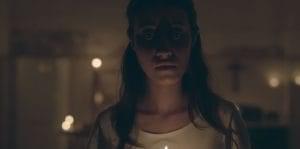
We have seen the destruction wrought by manipulative power numerous times in modern history, more notoriously with those of religious cults. Images of the 1978 mass suicide of Jonestown, the 1993 Waco siege, and the 1995 Tokyo subway sarin gas attack come to mind, although cult behavior comes in all shades and shapes (and not all documented cults are inherently dangerous). Resultedly, due to our real-world experiences with them, cults make for fascinating subject matter for film and television, and we’ve had a considerable share over the past decade from all over the world. This is where Sonia Escolano’s sophomore feature film House of Sweat and Tears (original title: Casa de sudor y lágrimas) comes into play, using the well-publicized cult of the Spanish Roman Catholic seer Amparo Cuevas as a baseline for exploring cult behavior, and the intense power of hyper-suggestibility.

“…compounded by the arrival of a mysterious man who begins sowing doubt and mistrust amongst the flock.”
Ella (Alzira Gómez) is the autocratic prophet of a religious sect, acting as a conduit for the Virgin Mary. She rules a small collection of followers in a secluded and claustrophobic building in the countryside (probably condemned, given the exterior’s decrepit quality), where members are forced to wear glass shards in their shoes, scar their flesh, eat imaginary food, and to care for chicken eggs as if they were their own souls. When Sophie (Coline Charvin) accidentally breaks her egg, events are set in motion that not only shatter the seeming peace of the household, but personal egos and vendettas rise to a boiling point. This dire situation is compounded by the arrival of a mysterious man who begins sowing doubt and mistrust amongst the flock.
This is a film of nuances and small moments, which works to the narrative’s detriment and to its benefit. Several sequences are disjointed and lack clear segues and context to fully inform the audience as to what is happening (and why), which is echoed by the final scatterbrained moments before the ending credits roll – the filmmakers seemed to had an issue stringing together what they wanted to say into an actual narrative. However, that honestly is where my criticisms seem to pitter out, besides for a couple moments of questionable practical effects toward the final act. The remaining runtime is overfilled with sublime acting, highly effective minimalist cinematography, truly amazing sound design, and one of the best examples of palpable cinematic tension without the use of any musical score that I have seen in recent years outside of Darren Aronofsky’s mother!

“…one of the best examples of palpable cinematic tension without the use of any musical score…”
The cast manages to make the bland and cagey setting pulse with secrecy and trepidation, even in scenes with little consequence to the story, always keeping audiences uncertain as to when something significant (or terrible) will occur. The emotions running through this film possess a powerful profundity and melancholy, with even the more repugnant characters eliciting strong sympathies at the most unusual times. In other words, we believe that these characters believe in what they practice, so all of the events that occur make sense within the context of the story, when they logically may not otherwise. While the narrative is highly interchangeable with any film or series currently focusing on cult behavior, it really is the power of the cast and the strength of the direction that makes the whole experience an intoxicating and frightening time at the movies.
Even with multiple moments resulting in confusion due to the esoteric methodology by which we experience the plot, House of Sweat and Tears is a uniquely resonant take on a well-worn subject and one that bodes extremely well for the filmmakers’ future in the medium.

House of Sweat and Tears (Casa de sudor y lágrimas) (2018) Directed by Sonia Escolano. Written by Sonia Escolano. Starring Alzira Gómez, Coline Charvin, Padi Padilla, Eudald Font, Paula Mateu.
8 out of 10
